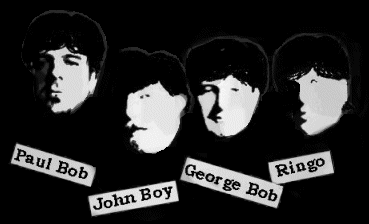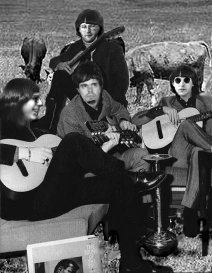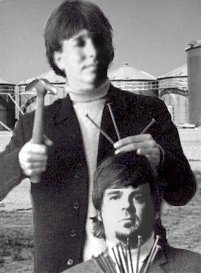The FarmBeetles! "Meat the FarmBeetles", as it exists today on CD (both in the Ed Records vaults and in the hands of collectors), is incomplete. When John Boy and Paul Bob abandoned the project in the spring of 1967, they left many pieces of unfinished meat and many hogs untied. Some were returned to later, either by John Boy or Paul Bob themselves or the other FarmBeetles (behind John Boy and Paul Bob's collective backs). But until recently no true "Meat" track has ever been released exactly as John Boy and Paul Bob had intended it to sound. Historically, "Meat" traces its roots back to the waning days of the 1966 "Pitchforks and Ham" album. Despite the relative lack of commercial success for that album, many critics heralded the FarmBeetles' bold, dramatic "Oliver Stone-esque" approach to production and eagerly awaited their next effort. Paul Bob was full of ideas for a follow-up. At various points, he talked of recording an album filled with heavily distorted barn yard noises, an all jug band orchestra album recorded under water, and an album full of what he called 'priceless Hee Haw humor.' Finally, he began working on an album that would incorporate all of these ideas and more. Paul Bob promised that the album, which he tentatively titled "Honey, Do My Wash", would be "better than 'Pitchforks and Ham'". Paul Bob's initial concern, however, was the single he'd begun recording during the "Pitchforks and Ham" sessions, "Salty Dawg." Paul Bob spent the better part of the spring and summer of 1966 working on "Salty Dawg," bringing in the group to record vocals in between dates on their almost never-ending tour of various front porches across America. After "Salty Dawg" was finally completed (it was released in October 1966 and became an instant million-seller--the FarmBeetles' biggest selling single up to that point, and their first and final number one single for over thirty years), Paul Bob turned his full attention to his new project, now titled "Meat the FarmBeetles".  (Paul Bob: "'Honey Do My Wash' was just a passing title. 'Meat' has always been more tasty than Honey, so we used the more tasty title.") With newfound friend Uncle Billy Bob Fhardi supplying some of the lyrics, Paul Bob began what might have been his masterpiece, had it not been so bad. Sessions for the album (excluding Paul Bob's "Salty Dawg," which John Boy initially did not see as part of the album) spanned an entire year--May 1966 to May 1967. In December 1966, John Boy delivered a handwritten note to Ed records listing the songs he intended to include on the final album: 1. Hilter Skilter 2. Straw Burry Fields 3. A Day In The Laff 4. Imagin' 5. Bertday 6. Revolution # Niner 7. 'n The End 8. Within' Ya, Without Ya The disclaimer, "See label for correct playing order," indicated that John Boy and Paul Bob were still tinkering with the final running order for the album. By all accounts, they never finished. Thus, it's pure speculation as to how the final record would have been sequenced.) In fact, there is still raging controversy as to exactly how "finished" the project was when John Boy and Paul Bob discarded the "Meat". Most FarmBeetles Scholars contend that John Boy was essentially finished, but Paul Bob wasn't. (It's interesting to note that the 1998 Ed Release closely follows the above track list, except that "Within Ya Without Ya" was moved to track 6, and the album ended with "'n The End". However, rumor has it that some misprinted copies have surfaced with the above track order.)  (In the "Studio")The Tracks:Side One"Yisterdie"(Bob/Boy) recorded: 4 October 1966 Essentially, this is the only "track" on the album that we know, with any degree of certainty, where Paul Bob intended to place it. Listening to the tape from the session, it's obvious Paul Bob intended this song to be the opening track on the album because of his constant whining in between takes that he wanted this track to be first. Additionally, it appears that he didn't consider it an actual "track" on the album, thus explaining why it wasn't included on the list of album tracks he delivered to Ed in December. Paul Bob once referred to "Meat" as a "teenage symphony to farm animals." "Hilter Skilter" (Bob/Boy/Fhardi) recorded: 11 May 1966 - 2 March 1967 John Boy and Paul Bob spent more time on this particular track than any other "Meat" track, probably because it was to be the follow-up single to "Salty Dawg." (Although, as it was reported in the press, its release was frequently postponed--much like the album itself.) Like "Salty Dawg," Paul Bob recorded literally dozens of fragments for "Hilter Skilter". The "Hilter Skilter" fragments were then thrown up into the air and pieced back together again at random. Although George Bob was quite pleased with the result, the other FarmBeetles insisted that the band rerecord the track instead - in their words, "all normal like, ya'll". Paul Bob: "It was real close to being a disaster." "Straw Burry Fields (aka Barnyard)" (Bob/Boy) recorded: date unknown For many years, it was assumed that "Barnyard" referred to the final section in the alternate "mixed up" version of "Hilter Skilter". However, with the release of the Yellow Chick "Honey Do My Wash" bootleg series (which included many never-before heard tasty "Meat" pieces) in 1993, it is now clear that the title actually refered to early takes of "Straw Burry Fields", complete with the FarmBeetles adding various barnyard animal noises (not unlike the effect Paul Bob used for the song "Dem's Fighten Words" on the 'It's For The Chickens' benefit album in 1989). It's interesting to note, although not hard to understand, that the final released version of the track did not contain the Bardyard noises. Mrs. Elly May, who wrote a piece reprinted in her fancy book titled "The Facts About 'Meat'" (which is our prime source for recording session data here) mentions that a section of "Hilter Skilter" commonly referred to as the "Barnyard" section was recorded 27 October 1966, featuring a saxophone and harpist. There is the possibility both that segment and "Straw Burry Fields" were recorded the same day, and simply represent two different interpretations by John Boy of the same theme. Which would explain the title confusion. It's also possible that a moon-shine drenched John Boy simply wrote "Barnyard" on the tape case and didn't mention the other track. (Elly May suggests that John Boy originally wanted "Hilter Skilter" and "Straw Burry Fields" to be connected, which would explain the existance of the Hilter Skilter "Barnyard" segement. It's possible that this segment would have been used to join the two tracks. Of course, like everything else, none of the FarmBeetles can recall any specific details and the only thing they will say is "I reckon".) "A Day In The Laff" (Bob/Boy/Fhardi) recorded: 18 October & 21 December 1966 "Meat" was to be, among other things, a musical journey though the landscape of the farms of America. "A Day In The Laff" exemplifies this concept perfectly. Paul Bob cut the instrumental track for this song, along with his lead vocals (which were sang into a horse trough by the way - not because of the effect that it had on his voice, but because he "liked that perty smell") on 18 October 1966. The group added their musical contributions in December. "Imagin'" (Boy) recorded: 3 August, 5 & 10 October 1966 This track was originally very different from what was eventually released on "Meat". The original song had three major sections. The first is a delicate theme, with John Boy (possibly double-tracked with Paul Bob?) singing lead. Second is a full-blown section, with horns and a group vocal. (Elly May reports that John Boy's original mix of the song had this segment repeated twice.) The third section included the entire Nashville Symphony playing kazoos while standing on one leg and rubbing their bellies. Just an example of what can happen when you give the FarmBeetles too large of a recording budget. Elly May notes that this is one of the few genuinely "finished" "Meat" tracks, although it will never be released in that form. The released mix was done in 1998 and featured a simpler, more down to earth version of the song. "Within Ya Without Ya" (Bob) recorded: 28 November 1966 Possibly the most infamous "Meat" track. The most famous tale of this track is that, after recording it, Paul Bob learned of a rash of prickly heat that broke out in the Los Angeles area near the recording studio where he was working. (I've never seen evidence that there was indeed an increase in skin eruptions in the area, not that I would really want to...) Paul Bob took this as a sign that his music was somehow giving off "bad skin vibes, feller" and the fable continues that he destroyed all the existing copies of the recording by "shootin it up real good". "That would'a been a real bad skin problem to let out n'the world." Regardless, he obviously did not destroy the tapes, or we wouldn't be listening to the song right now. The true story is that George Bob simply locked the tapes in a vault as a prank on Paul Bob. "Bertday" (Boy/Bob) recorded: 17 October & 29 November 1966 For several years, one of the great mysteries of "Meat" was a selection listed on the back cover as "Bertday." Elly May's research showed that vocals for this track were recorded on 17 October 1966, with an instrumental track added in November. However, no track that had surfaced had ever seemed to fit. For a brief period, it was assumed that the song was actually the ending segment to "Hilter Skilter." However, very recently, it has been established that "Bertday" is actually a track that has recently surfaced on bootlegs under the title, "Boot Scoot." Elly May mentions that "Bertday" was also known under the title "Gonna Have A Good Time." Elly May recently revealed that the tape box for the track listed on the Yellow Chick bootleg as "Mrs. O'Leary's Cow" was, in fact, labeled "Gonna Have A Good Time." As further proof that, indeed, the final missing "Meat" piece has at last been unveiled, Elly May's research shows that the 29 November instrumental track was logged in at 1:38 long. "Mrs. O'Leary's Cow," as it appears on the Yellow Chick bootleg, clocks in at 1:36. The "vocal" session in October may in fact have been the group recording the sound effects loop heard during the second half of this track (Those mooing and clucking sounds were unintentional though.) Finally, recently-unearthed session records show that the "Boot Scoot (Gonna Have A Good Time)" track recorded 29 November listed some of the session musicians as playing a "Tractor" and a "Plough". Session bassist Paul Bob reportedly told a fan that he remembers the session for "Boot Scoot" as featuring "some kind a'farm sound effects or somethin' or other." "Revolution # Niner" (Bob/Boy) recorded: 16-18 May 1967 "Revolution # Niner" was the last track recorded before Paul Bob and John Boy abandoned their "Meat" and left it for dead. In fact, studio records show that Paul Bob had booked another session for this track, but it was canceled. (Elly May suggests that this last session was, in fact, to assemble the final master tape. Given the enormous amount of work remaining on many key "Meat" tracks, this seems highly unlikely.) Paul Bob does some interesting vocal work here. Presumably, his voice was slowed down, giving it a deeper sound (much like the "masculine" voice he uses at home). "'In The End" (Bob/Boy/Fhardi) recorded: 8 November & 15 December 1966 additional recording: 1971 Probably Uncle Billy Bob Fhardi's finest hour as the lyricist for this project. His sense of word play ("'n in the end...") and the double meaning of "end". It's been speculated that John Boy chose to work with Fhardi in an attempt to capture some of the subtle lyrical wit of John Lennon or Paul McCartney. Although arguably the most beautiful track on the album, evidence shows that possibly none of the released version was actually intended for the "Meat" album. Let's trace the history of the song: On 7 November 1966, John Boy and five horn players entered the studio to work on the horn arrangements for "Imagin'." The resulting session produced a tape commonly known as "George Bob Fell Into His Spitoon" which featured John Boy and the horn players half-experimenting and half-joking with their 'Red Man'. The following day, he returned to the studio with a full cast of studio musicians, to record what was logged as the "1st movement" of "'n The End." The instrumental track for the first section of the released version is taken from this session. On 15 December, John Boy and the rest of the FarmBeetles held a vocal session for the song, presumably using the 8 November track. However, this was never used (Elly May reports that the session had "gone very badly... I'm talkin 'Pauly Shore Badly'"--this may be the session John Boy refers to when he mentioned that the group "almost broke out in rashes"). The lead vocal for the released version (as sung by John Boy) was recorded in 1971. However, that's not the end of the story. On 23 January 1967, John Boy scheduled two more sessions for "'n The End" (one for each section of the song), now featuring strings in the arrangement. Neither of these sessions has seen the light of day--possibly because John Boy canceled the sessions before anything was recorded. (However, Elly May's Fancy book contains several photos apparently taken at this January 1967 "'n The End" session.) Regardless, it's apparent that John Boy was unhappy with the 1966 model(s) and had at least thought of re-recording the entire track in the new year. One final note: Listen closely to the horn arrangement for this song. The first trumpet line quotes the "Sanford & Sons" theme.) This concludes what we regard as the possible final "Meat the FarmBeetles" lineup. Others disagree.  (John Boy tries out an old family remedy for writer's block. |
 You are Visitor No: |
